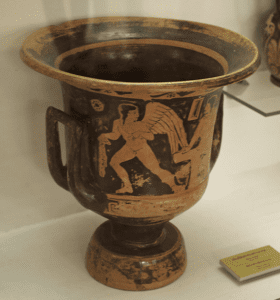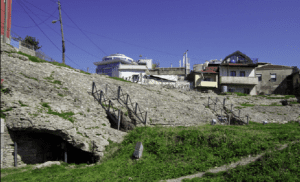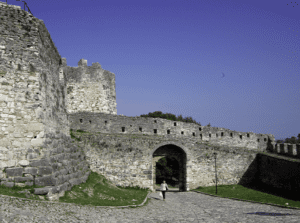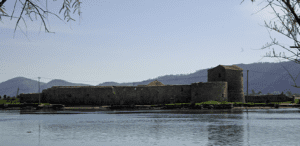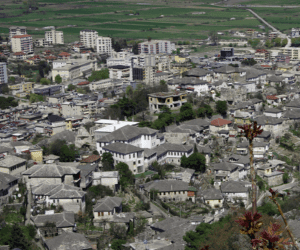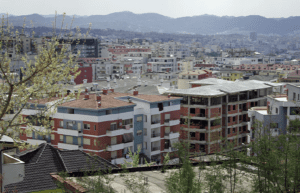“We remain in darkness forever if we don’t know our own history”
This is carved on a stone in the National Historical Museum in Tirana which is the best place to understand the history of Albania. You really do need to have an outline of its history to understand and appreciate the country.
Albania has a long history and traces of the Illyrian, Roman, Byzantine and Ottoman civilisations are remarkably well preserved. The Illyrians built large well fortified cities from the C6th BC onwards trading with Greek colonies along the coast. After a period of war with Rome, Albania was settled by the Romans in C2nd BC, bringing a period of peace and prosperity to Albania. They built roads connecting Albania to the rest of the Roman Empire. Many Roman citizens bought estates and settled. When the Western Empire collapsed in the C4th, Albania came part of the Byzantine Empire and new basilicas were built. In the C10th there was unrest between Albania and Bulgaria. Fortifications of many cities were strengthened or rebuilt.
There was further unrest with the Normans, King of Sicily and the Angevins holding control at different times. By the C14th Albania was a patchwork of semi independent states run by powerful Albania families.
In 1417 Ottoman forces captured Vlora and Gjirokastra. Their grip on the country was weak and there were minor rebellions which were successfully put down by the Ottomans. In 1444, Skanderbeg emerged as leader of the Albanian clans and successfully united them in a struggle against the Ottomans, resisting them until his death in 1468. He is still regarded as a national hero and there is a museum to him in his home town of Kruja.
Although many Albanians converted to Islam, Catholicism survived, particularly in the coastal cities and mountainous areas in the north. Orthodox Christians survived in the south.
Albania remained under Ottoman rule until the C19th when the Albanian Nationalist movement began to emerge with an emphasis on cultural and linguistic unity. The Ottoman armies crumbled during the First Balkan War in 1912. Delegates gathered at Vlora in 1912 and declared their Independence from the Ottoman Empire, so saving their country from being absorbed by their Balkan neighbours.
During the First World War, Albania sank into anarchy as its leaders fought among themselves for power. Ahmet Zogu gradually emerged as a leader, rewrote the constitution and eliminated his opponents, before crowning himself as King Zog.
By the mid 1920s, there were good relationships with Italy. Italian colonists were settling in Albania and Italian companies were building roads and improving harbours. Tirana replaced Vlora as the capital with many of its buildings were built by Italian architects. Mussolini annexed Albania in 1939 and King Zog and his family (along with the contents of the treasury) went into exile.
Albania remained under Italian control during the Second World War, later coming under German occupation. Many Albanians refused to accept German occupation with the resistance movement lead by Enver Hoxha with help from the British SOE.
Albania was in a very poor condition by the end of the war. The United Nations implemented a relief programme and a new government with Enver Hoxha as Prime Minister. Good relations were developed with Yugoslavia and later with Russia and then China. The property of anyone who had fled the country was confiscated by the state and all surplus agricultural land became state owned. Albania became a communist country and relations with the West deteriorated. Albania gradually became more isolated withdrawing links with USSR and later with China. In 1967, Albania banned religion and declared itself the world’s first atheist state. Priests and clerics were shot or imprisoned. Churches and mosques were demolished or converted for secular use. Religion remained banned until 1990. It remains a secular society today with only about 8% of the population actively practising. It is a very tolerant society. Muslims and Christians live happily together and intermarry.
After Hoxha died in 1985, his successors tried to improve relations with Albania’s neighbours. In 1990, Student demonstrations and hunger strikes demanded better living conditions, with freedom and democracy. Statues of Enver Hoxha were pulled down and the first multipart elections held in 1991. These were quickly followed by another election in 1992, won by the Democratic Party and entry into the free market. The government collapsed in 1997 following the failure of pyramid investment schemes offering unrealistic returns leading to the collapse of banks, many bankruptcies and street riots. Anarchy lasted for weeks and was only brought under control by an international peace keeping force. Ordinary Albanians were horrified at what was happening to their county and this has probably been the main reason stability has been restored and Albania has avoided slipping into further turmoil when political tensions have been high. Albania now has a healthy banking economy and good rates of growth. It has been a member of NATO since 2008 and is wanting to join the European Union.
It has only recently become open and welcoming to tourists.
All the details of my trip to Albania with my photographs can be seen “here.”:http://wasleys.org.uk/eleanor/otherholidays/albania/index.html
